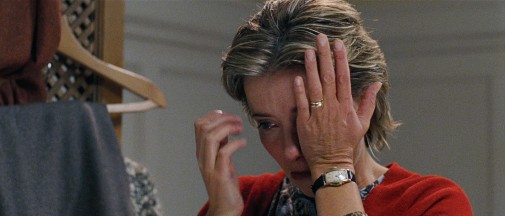
With the holiday season upon us, a festive Almost There entry feels appropriate. Love Actually, Richard Curtis' 2003 mosaic narrative full of Christmastime romance, is one of the few notable examples of holiday movies that vied for Oscar gold. With a cast like that, it's easy to see why. There's also the movie's commercial success and lasting popularity to consider. All that being said, it's with great sorrow that I confess myself a Grinch when it comes to this particular brand of Yuletide cheer. Between sexist tropes and tired romcom mechanisms, the movie comes off more like a lump of coal than a present.
Still, every cloud has a silver lining, and plenty of the movie's actors are up to some excellent work. Emma Thompson, in particular, delivers one of the best performances of her career. As if acting a Bergman-esque marital drama against a backdrop of Christmas schmaltz, her supporting turn is as disarmingly funny as it is devastating…
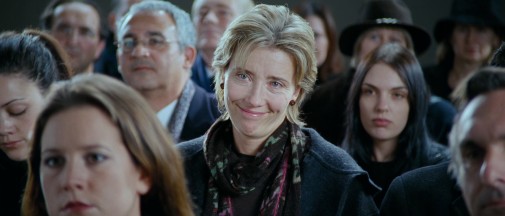
As Karen, Emma Thompson plays tragedy as comedy from minute one. She enters the movie, talking to Liam Neeson's grieving widower, with the acerbic wit of someone who likes to joke their way out of gloom. This strategy remains true right until the end, making the moments when the character breaks all the more lacerating to witness. We first notice how Karen might use humor as a feeble shield against despondence when we see her at a funeral. Laughing through tears, she projects years of loving friendship with a single look, outwardly trying to laugh at the eulogy's bleak anecdotes.
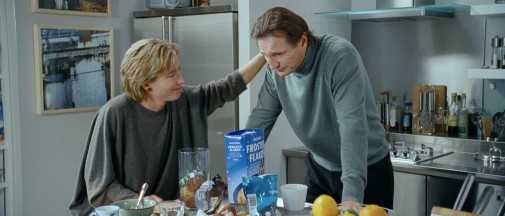
Her later scene with Neeson is similarly affecting, as it balances on a knife's edge between sardonic merriment and sincere feeling. Through a joke-laced show of genuine support, she helps a pal who's struggling in mourning agony. Karen's words may sound callous, but there's a lot of affection in Thompson's delivery. Similarly, her posture may configure itself in clownish figures when she's trying to amuse, but the actress remembers to show how Karen's there to hold her friend in his weeping grief. In some ways, Thompson is in dialogue with the audience, preparing the viewer for what's ahead by planting hints of how this woman deals with life's miseries.
A lot of actors play heartbreak by forcing the emotion, externalizing the interior through expressive transparency. Thompson does the opposite here and is masterful at it, playing a person who's trying to hide her vulnerability. In many ways, that's what most of us do, either to protect ourselves or to protect our loved ones. When talking to a mourning friend, we put our sadness in the background. When a mother feels horrid, she keeps it from her kids' perception, lest they get concerned, lest they get hurt. This anti-dramatic truth in performance brings an odd authenticity to Love Actually, a note of sourness in an over-sugared treat.
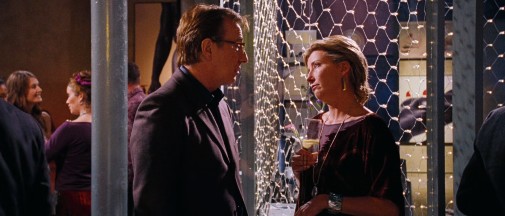
For all this talk about her greatness with Liam Neeson, it's with Alan Rickman that Thompson spends most of her little screen time. As on-screen husband and wife, they have a well-oiled dynamic whose mundane ease speaks of years of cohabitation. Even the way they move through the space of their home feels automatized by a lifetime of repetition. We may see little of the marriage, but we get a sense of its state, of its sturdy foundations and how they've been corroded by routine, by boredom, by unexciting domesticity. It's during a Christmas party that the cracks in the edifice of matrimony start to open into chasms.
But then, as with everything, Karen responds to the bleakness in her life with a smile and a laugh, wielding them defensively. Fear and disappointment flash on her expression as she watches her husband dance with his vixen co-worker. It's heartbreaking, especially because of how restrained Thompson is. However, as soon as Karen has settled into control of her disposition, she turns into a jolly wing(wo)man to Laura Linney, swatting away the inklings of melodrama. This technique reaches its apotheosis when Karen finds a necklace in the pocket of her husband's coat.
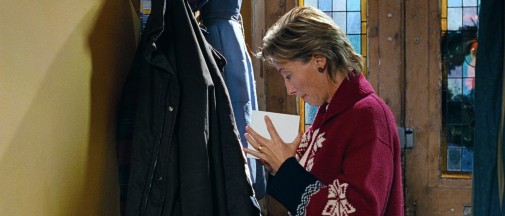
She's surprised, delighted, both at the jewelry and at the thought that her beloved isn't growing distant. He still cares, he still wants to delight her on Christmas Eve with an unexpectedly expensive present, a thoughtful reminder of her place in his life. Unfortunately, it's not for her. We know it and yet Thompson doesn't play the moment by appealing to our sympathies. There's no beatific smile on sight, replaced instead by a corny bit of farcical mugging. Karen thinks, quite justifiably, that she's living in a romantic comedy. She's about to discover she's not.
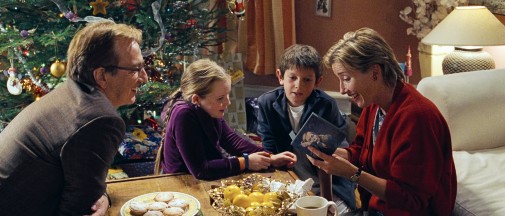
When she opens the gift and finds, not the necklace, but a Joni Mitchell CD, Thompson's Karen crumbles while trying to hold everything inside, invisible. Her voice becomes a tad higher, her cheer gains a panicked quality. At that moment, she's realizing what happened. More than the disappointment of betrayal, it's the process of reckoning with what this means for her life going forward that truly hurts. The way she moves her hands, how she stays hidden in her bedroom with no place to go, frozen in shock, it all devastates.
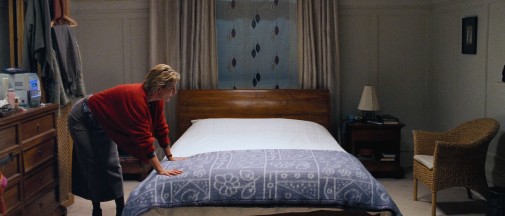
My favorite detail of this tour de force has always been the unexpected act of fixing the bedspread. It's, in many ways, an insignificant gesture, though its presence sings an aria about a woman trying to keep a modicum of control over her life, her surroundings. She's also leaning on the bed, supporting her body almost as if she's afraid of falling, crumbling, collapsing. A simple movement says more than long monologues ever could. Thompson plays the entire scene in silence, the director sacrificing the garrulous text for a needed pause. Curtis knows that Thompson can handle the challenge, and she delivers.
Despite all this, Karen decides to stay and cuts through her husband's self-involved midlife crisis with a calcinating heart-to-heart. There's incredible wit to the way Thompson negotiates the tonalities of her confrontation with Rickman. The character's trying to keep it together, not so much attempting to hurt him as making him see how much he destroyed her. Again, the actress' not necessarily playing against the text's explicit emotions, but there's a restraint to her acting, a frozen shock to her bending steeliness, a desperate levity to her show of pain. The last glimpse we get of her, at the airport, is bittersweet too. Instead of hinting at a reconciliation, Thompson highlights the prickliness of the couple. Their marriage may heal, but it's not there yet. Not by a mile.
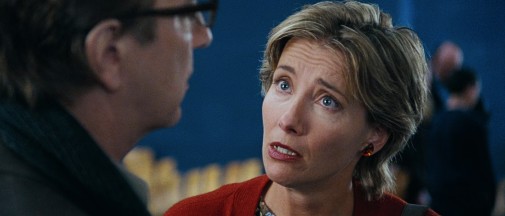
When it comes to the awards race proper, Thompson scored her biggest precursor when she got a BAFTA nomination. While Love Actually scored two pretty big Globe nods, no actor was among the honorees. Beyond the big precursors, Thompson got support from the Satellite Awards, the Phoenix Film Critics Society, London Critics Circle, and the AARP. She also won at the Empire and the Evening Standard British Film Awards in the category of Best Actress. Those last two victories notwithstanding, Thompson's Oscar bid was in the Best Supporting Actress category. In that race, she was ignored by AMPAS in favor of Shohreh Adghdashloo in House of Sand and Fog, Patricia Clarkson in Pieces of April, Marcia Gay Harden in Mystic River, Holly Hunter in Thirteen, and, the winner, Renée Zellweger in Cold Mountain.

Love Actually is available to stream on fuboTV and Spectrum On Demand. You can also rent it from most services.